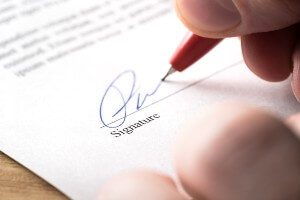 Many recreational activities, from skiing to attending organized events, require participants to sign a waiver of liability. Most participants who sign a waiver may not fully understand the legal implications involved if they suffer a personal injury and whether the waiver is even valid and enforceable.
Many recreational activities, from skiing to attending organized events, require participants to sign a waiver of liability. Most participants who sign a waiver may not fully understand the legal implications involved if they suffer a personal injury and whether the waiver is even valid and enforceable.
Below, our legal team explains liability waivers in greater detail and the exceptions that may allow you to sue for a personal injury after signing a waiver of liability. You can learn more about your rights and available legal options during a risk-free, zero-obligation consultation. We only get paid if you get paid.
Proven Results. Millions Recovered. Ph: (866) 320-4770.
What is a Waiver of Liability?
A waiver of liability is a contract that says you are giving up your right to sue an individual or organization for injuries you sustain during the activity, even if that injury was due to their negligence.
Liability waivers are often used and required to be signed by certain businesses and organizers, such as amusement parks and skydiving facilities. For example, a waiver for a skydiving facility may say if you get injured while skydiving, you agree not to pursue a personal injury case against the instructor or the owner of the skydiving company.
Sometimes car dealerships may try to mitigate their responsibility by having test drivers sign a liability waiver. These waivers are an attempt to transfer any and all liability for damages to the test driver. If you sustain an injury in a car crash during a test drive, the car dealership could rely on the waiver.
Are Liability Waivers Always Enforceable?
The law surrounding waivers in Ontario is constantly shifting. However, as it stands, liability waivers are largely upheld by the courts. Certain requirements must be met for a waiver to be valid and enforceable.
The language used in a waiver must clearly refer to the accident’s circumstances. In order for an owner or organizer to be able to rely on a waiver against claims of negligence, the waiver needs to refer to risks and injuries caused by that party’s negligence.
An owner or organizer must also take reasonable steps to bring the waiver to the attention of the person signing it. He or she must have sufficient time to read and understand the terms before signing it. A liability waiver should not be signed unless you are completely aware of the risks involved.
When Are Liability Waivers Not Enforceable?
There are certain exceptions that exist. Generally, liability waivers are not enforceable if the injury or accident falls outside the defined scope of the waiver.
For instance, say your child’s afterschool youth program requires that you sign a waiver releasing them from liability in the event your child gets injured during indoor rock climbing. The organization will not be able to rely on the waiver if your child gets struck by a vehicle while crossing the parking lot.
The courts will look at whether a reasonable person would have understood all relevant facts at issue. Did the person signing the waiver intend to agree to waive his or her rights? Liability waivers will be considered invalid if a person’s signature was obtained fraudulently or through misrepresentation.
Ontario’s Occupiers’ Liability Act
Under Ontario’s Occupiers’ Liability Act, occupiers (meaning anyone who has ownership, possession or control of a premise) can obtain and rely on waivers. In order to do so, they must take reasonable steps to bring to your attention that by signing a waiver, you are in fact giving up your legal right to sue them.
However, another statute, the Consumer Protection Act, precludes an occupier from obtaining a waiver of liability. The Court of Appeal has held that this statute does not have any impact on the liability issues surrounding the recreational use of property in the case Schnarr v. Blue Mountain Resorts Limited. An occupier can rely on an otherwise valid waiver as a complete defence to a personal injury claim.
What About Minors and Waivers of Liability?
A waiver of liability may not enforceable if the person signing it is a minor or the person lacks the capacity to understand what it is he or she is signing. For instance, someone under the influence of drugs or alcohol. Whether you can get around a waiver will depend on the specific circumstances of your case.
Call Our Firm to Find Out If You Have Case
If you have been injured in an accident due to another’s negligence, an experienced personal injury lawyer based in Windsor is here to help. Our firm has decades of experience representing injury victims across Ontario, recovering millions in compensation on their behalf. The initial consultation is free of charge so there is no risk to you. There is no obligation to hire our firm after meeting with us.
We also work on a contingency fee basis, which means there are zero upfront fees. You only pay us for the services we provide if we are successful in obtaining compensation for you.
Contact Us Today to Learn More: (866) 320-4770.